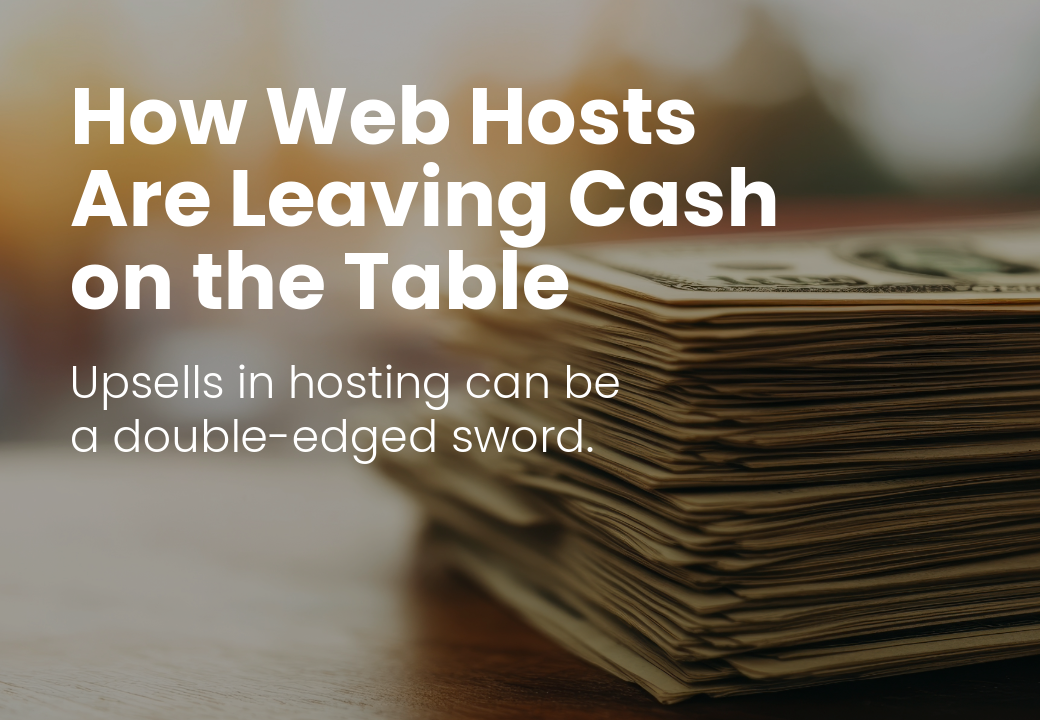Working with hosting providers day in and day out, I’ve seen one pattern repeat itself: the way upsells are handled makes all the difference. They can either be a quiet driver of loyalty and long-term revenue, or they can chase customers away before the transaction is even complete. Everyone remembers that GoDaddy checkout carousel, where clicking “next” felt like stepping into a maze of SSL offers, backup prompts, and malware scans. By the time you got to the end, you weren’t sure you even wanted the domain anymore. That is the kind of upsell that leaves a sour taste.
What customers actually want is guidance. A well-placed suggestion feels like a favor, almost like a recommendation from someone they trust. A forced upsell feels like a scam, and the difference between the two is often just a matter of timing and presentation.
The irony is that many hosts miss easy opportunities. Either they bury customers in irrelevant add-ons, or they fail to present the right upgrades at the right time. Both mistakes leave money on the table.
Shared Hosting Upsells
Shared hosting highlights this better than anything. The people signing up for shared plans are often first-timers: a blogger, a local nonprofit, a small shop finally taking their business online. They want it to be simple. They expect SSL, email, and nightly backups to already be included. When a provider removes those basics and sells them separately, the purchase feels less like value and more like a slow leak of hidden charges. Webmail is the one exception, since many users never touch it and simply forward to Gmail. Beyond that, bundling core features into the plan keeps trust intact and prevents churn.
VPS and Dedicated Upsells
VPS and dedicated hosting tell a very different story. These buyers are not looking for simplicity, they are looking for control. They expect to configure the OS, the control panel, the firewall, and they fully understand the need for backups. In fact, they are often eager to customize and will happily pay for the right solutions.
Backups are the clearest example. Most VPS customers understand the need to protect their data but hesitate over how to do it. When a host places JetBackup directly in the cart, clearly positioned as a professional-grade backup solution tailored for hosting, adoption goes up dramatically. The extra $5 may look modest, yet scaled across hundreds or thousands of servers, it turns into serious recurring revenue. What matters most is that customers don’t see it as an upsell, they see it as insurance and peace of mind.
Dedicated Packaging
Dedicated hosting is where upsells become real differentiators. A dedicated server client is already paying a premium, and most are prepared to invest a little more for a worry-free, fully managed environment. The key is clarity. When a provider says, “Here’s what’s included, and here are the services you can add to complete the package,” the conversation shifts from selling to serving. Enhancements like enterprise-grade backups, next-generation firewalls, intrusion detection, or performance monitoring no longer look like a menu of fees, they look like a roadmap of trust.
That trust is where the long-term money lives. A host that positions itself as a partner rather than a vendor extends the customer relationship. A one-year contract turns into three years. A VPS grows into a cluster. Clients come back not because they are locked in, but because they feel understood.
Managing Customer Trust
Smart operators see something even more profound: the influence of these choices on the entire brand. A managed dedicated server package that clearly states the core support and the optional layers of value doesn’t simply pad the balance sheet. It crafts the provider’s identity as a knowledgeable ally. The host is not a catalog of hidden fees but a curator of intentional, flexible support. As a result, reputation shifts, becoming a guarantee of alignment rather than an invitation to guess hidden charges. Clients are drawn to providers who clearly state, “We’re covering the core, and here’s where you guide the extras,” rather than those who obscure base functionality with a web of extra fees. The power is mild in pitch but resounding in trust.
The hosting market isn’t crying out for fewer upsells; it’s crying out for the right upsells. That is how you stop leaving cash on the table. Not by squeezing pennies from confused first-time buyers, but by offering meaningful value at the right moment, building a foundation for loyalty, growth, and reputation that lasts.
Jason Nickerson
With over 20 years of experience building and shaping the web, Jason Nickerson has worked across just about every corner of the industry. Jason’s career has mirrored the internet’s evolution — from the recovery after the .com crash to the open-source movement and the rise of cloud services that power the web today.
